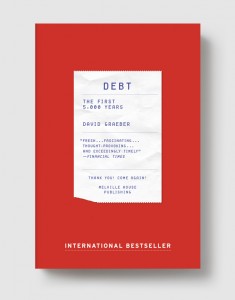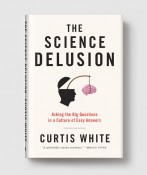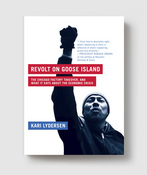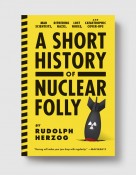
List price: $22.00
- Pages544
- ISBN9781933633862
- Publication dateJuly, 2011
- Categories
- Booksellers
- Media
- Academics & Librarians
Debt
The First 5,000 Years - Updated and Expanded Edition
David Graeber
“Brilliant … and unexpectedly funny.” —The Spectator (selected as a book of the year)
Every economics textbook says the same thing: Money was invented to replace onerous and complicated barter systems—to relieve ancient people from having to haul their goods to market. The problem with this version of history? There’s not a shred of evidence to support it.
Here anthropologist David Graeber presents a stunning reversal of conventional wisdom. He shows that 5,000 years ago, during the beginning of the agrarian empires, humans have used elaborate credit systems. It is in this era, Graeber shows, that we also first encounter a society divided into debtors and creditors.
With the passage of time, however, virtual credit money was replaced by gold and silver coins—and the system as a whole began to decline. Interest rates spiked and the indebted became slaves. And the system perpetuated itself with tremendously violent consequences, with only the rare intervention of kings and churches keeping the system from spiraling out of control. Debt: The First 5,000 Years is a fascinating chronicle of this little known history—as well as how it has defined human history, and what it means for the credit crisis of the present day and the future of our economy.
“An absolutely indispensable—and enormous—treatise on the history of money and its relationship to inequality in society.” —Cory Doctorow, BoingBoing
“Mr. Graeber is a star in the left-academic world…the most influential anthropologist in the world.” —The Chronicle of Higher Education
“Debt [is] meticulously and deliciously detailed.” —Ben Ehrenreich, Los Angeles Times
“Written in a brash, engaging style, the book is also a philosophical inquiry into the nature of debt — where it came from and how it evolved.” —The New York Times Book Review
“One of the year’s most influential books. Graeber situates the emergence of credit within the rise of class society, the destruction of societies based on ‘webs of mutual commitment’ and the constantly implied threat of physical violence that lies behind all social relations based on money.” —Paul Mason, The Guardian
“If you want to get a fresh perspective on the issue, take a look at a fascinating new book called Debt: The First 5,000 Years by David Graeber … not just thought-provoking, but also exceedingly timely.” — Gillian Tett, The Financial Times
“Remarkable.” —Giles Fraser, BBC Radio 4
“The book is more readable and entertaining than I can indicate… It is a meditation on debt, tribute, gifts, religion and the false history of money. Graeber is a scholarly researcher, an activist and a public intellectual. His field is the whole history of social and economic transactions.” —Peter Carey, The Observer
”Graeber helps by exposing the bad old world of debt, and clearing the way for a new horizon beyond commodification.” — The New Left Review
“Graeber has given us a significant piece of historical scholarship, one that demonstrates how a new understanding of debt might provide us with some clues for the future.” —Justin E. H. Smith, Bookforum
“[A]n engaging book. Part anthropological history and part provocative political argument, it’s a useful corrective to what passes for contemporary conversation about debt and the economy.” —Jesse Singal, Boston Globe
“Graeber’s book has forced me to completely reevaluate my position on human economics, its history, and its branches of thought. A Marxism without Graeber’s anthropology is beginning to feel meaningless to me.” —Charles Mudede, The Stranger
“The world of borrowing needs a little demystification, and David Graeber’s Debt is a good start.” —The L Magazine
“Controversial and thought-provoking, an excellent book.” —Booklist
“This timely and accessible book would appeal to any reader interested in the past and present culture surrounding debt, as well as broad-minded economists.” —Library Journal
“A brilliant, deeply original political thinker.” —Rebecca Solnit, author of A Paradise Built in Hell
“His writings on anthropological theory are outstanding. I consider him the best anthropological theorist of his generation from anywhere in the world.” —Maurice Bloch, Professor of Anthropology at the London School of Economics and European Professor at the College de France
“An amazing debut – conversational, pugnacious, propulsive” —Times Higher Education (UK)
Watch David Graeber’s latest interview on Charlie Rose
See David Graeber on Democracy Now with Amy Goodman
Watch Amy Goodman’s interview with Graeber for Democracy Now
Listen to Graeber’s interview with the CBC’s Sunday Edition
Watch Graeber’s interview with PBS’s Need To Know
Watch Graeber’s interview on Charlie Rose, discussing his controversial firing from Yale University
Read Graeber’s Wall Street Journal essay on the S&P downgrade of US Treasury Bonds
Check out Graeber’s Huffington Post slideshow on the ”9 Things You Didn’t Know About the History of Debt”
Read an interview with Graeber for CNN’s In the Arena blog
Check out Flavorwire’s slideshow on ”Extraordinary Literary Debts” inspired by Debt
Read Graeber’s essay for the Washington Post website.
Listen to Graeber’s interview with WNYC’s Brian Lehrer:
Listen to Graeber’s interview on Pacifica Radio’s Letters and Politics
Listen to Graeber’s Interview with The Writer’s Voice







